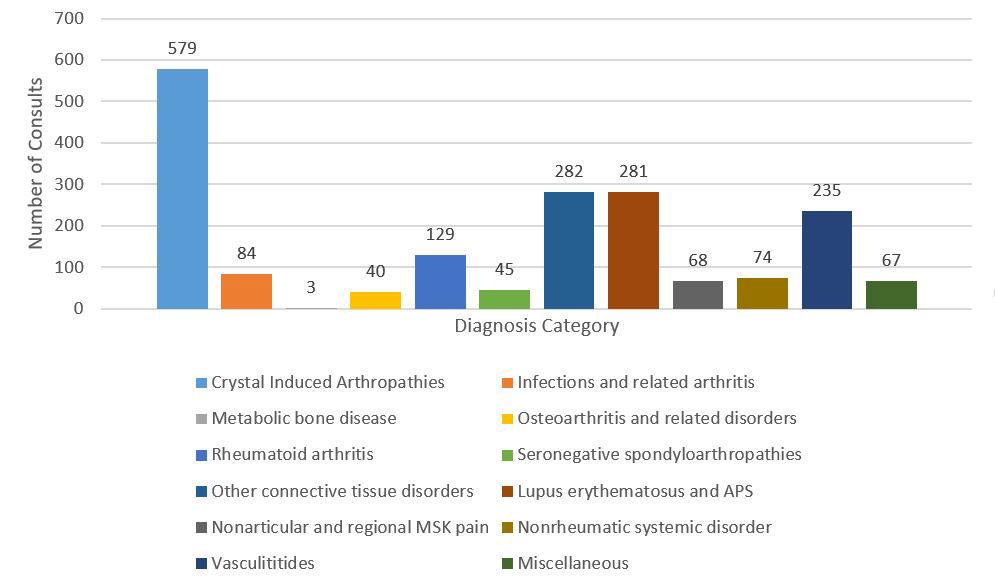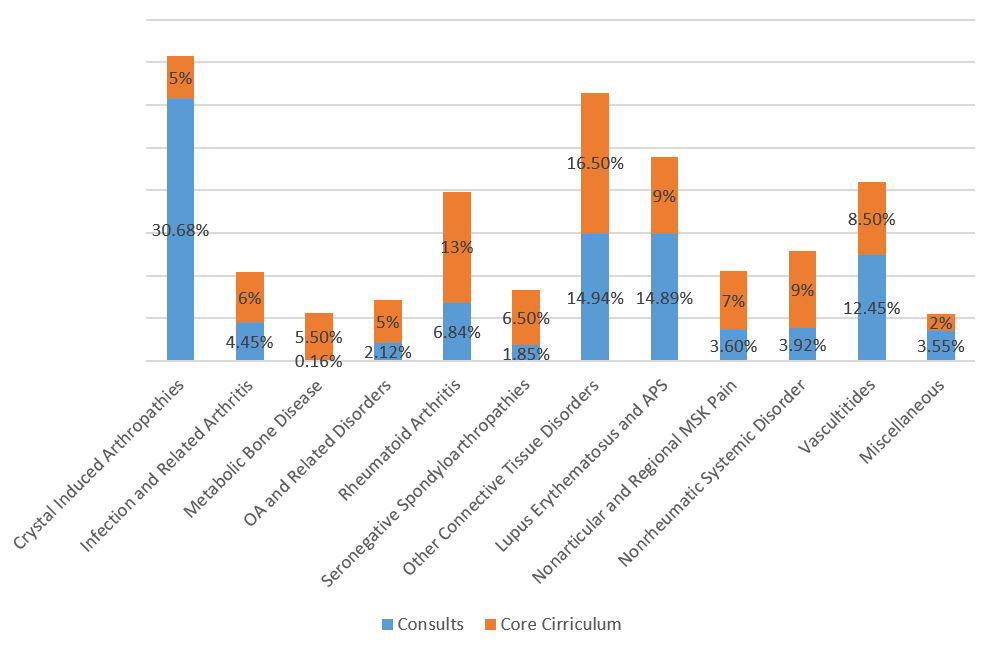Session Information
Date: Sunday, November 10, 2019
Title: Education Poster
Session Type: Poster Session (Sunday)
Session Time: 9:00AM-11:00AM
Background/Purpose: Review inpatient rheumatology consults over the last 16 years at a major military academic medical center to analyze trends in rheumatic disease presentation, consultative requests by other services, and a representation of core educational topics for the fellowship curriculum based on medical content categories for the Rheumatology Board Examination.
Methods: The Rheumatology Fellowship documents every formal inpatient consultation request from any service. The hospital provides services for all active duty, their families, and retirees and inpatients have access to all medical subspecialties. The fellow documents date, reason for consult, and requesting service. Records were categorized by reason for consultation. If the consultation request was unclear, record review was done to determine final rheumatologic diagnosis. Each consultation request was further characterized by diagnoses into pertinent educational core categories as outlined in the 2015 core curriculum outline for rheumatology fellowship program to include: crystal-induced arthropathies, infection and related arthritis, metabolic bone disease, osteoarthritis and related disorders, rheumatoid arthritis, seronegative spondyloarthropathies, other connective tissue disorders, lupus erythematosus and antiphospholipid syndrome, nonarticular and regional musculoskeletal pain, nonrheumatic systemic disorder, vasculititides, and miscellaneous.
Results: From April 2002 until June 2018, a total of 15,0359 adult patients were hospitalized under the care of all inpatient services during this 16-year period. From this population, 1887 consultations were requested for the Rheumatology service. These consultations were completed by 41 fellows over the studied period. Overall 1.25% of admissions required an evaluation by Rheumatology. The most common consult request was evaluation for crystal-induced arthropathies at 30.68% of all consults followed by evaluation for other connective tissue disorders and systemic lupus erythematosus at 14.94% and 14.89% respectively. In comparison to the educational objectives for the board certification examination, crystal-induced arthropathies represents only 5% of tested information while other connective tissue disorders accounts for 16.5% of tested material. For the Rheumatology program, the average fellow evaluated 25 consults per academic year and 46 consults in the 24 months of fellowship.
Conclusion: The adult Rheumatology fellowship at our military academic hospital provides consultation to surgical and medicine services and provides invaluable learning and teaching experiences for the fellowship. As trends in diagnosis and treatment emerge, the fellowship curriculum should continue to change to best prepare future rheumatologists. Continued analysis of the data to identify trends over time can help to optimize graduate medical educational topics at both the residency and fellowship levels as well assist with quality improvement strategies to enhance the curriculum and resources for the future.
To cite this abstract in AMA style:
Cruz C, Edison J. An Analysis of Inpatient Rheumatology Consults at an Academic Military Medical Center over 16 Years: Do Consults Requests Accurately Reflect the Curriculum and Prepare Fellows for Board Certification and Future Practice? [abstract]. Arthritis Rheumatol. 2019; 71 (suppl 10). https://acrabstracts.org/abstract/an-analysis-of-inpatient-rheumatology-consults-at-an-academic-military-medical-center-over-16-years-do-consults-requests-accurately-reflect-the-curriculum-and-prepare-fellows-for-board-certification/. Accessed .« Back to 2019 ACR/ARP Annual Meeting
ACR Meeting Abstracts - https://acrabstracts.org/abstract/an-analysis-of-inpatient-rheumatology-consults-at-an-academic-military-medical-center-over-16-years-do-consults-requests-accurately-reflect-the-curriculum-and-prepare-fellows-for-board-certification/


